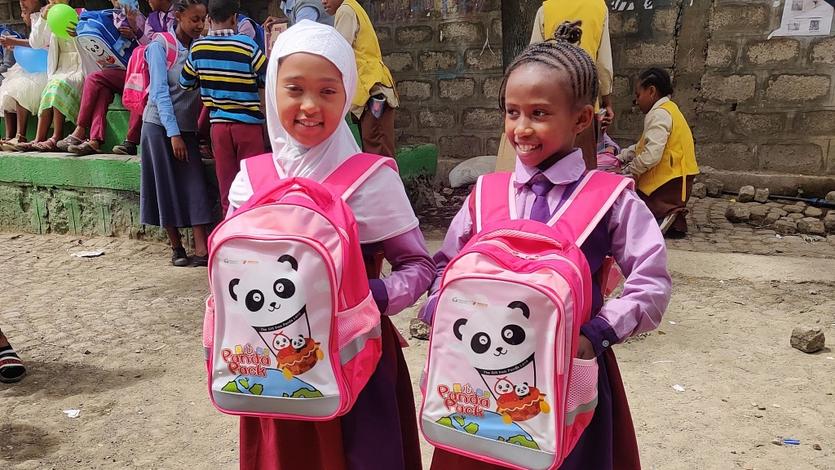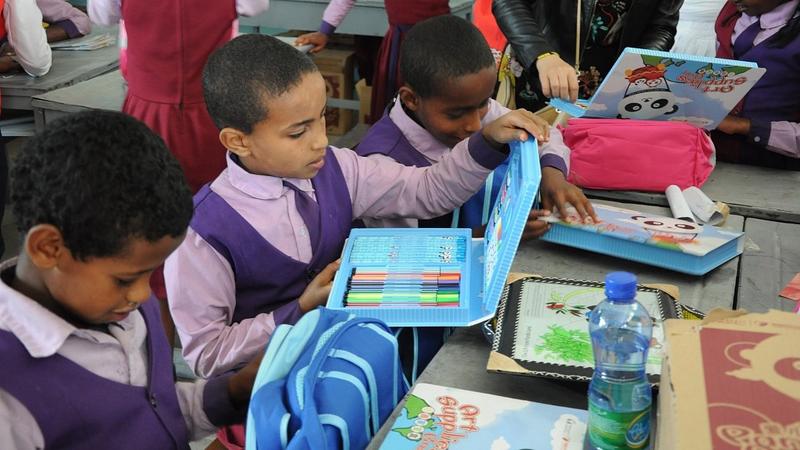 1,289 lucky Ethiopian children were the first to receive Panda Pack Project's gifts. (PHOTO / VCG)
1,289 lucky Ethiopian children were the first to receive Panda Pack Project's gifts. (PHOTO / VCG)
In 2019, Buyinza Farduk, then a seventh grader in Uganda, received a backpack filled with school and daily supplies.
He loved the bag, which had a panda painted on it, and wrote a letter of thanks to the sender of the gift in China.
"Thank you, though I don't know who you are," the letter said, explaining that Emma, the project's local staff member who distributed the bag, couldn't tell him the name. "I remember she said that many Chinese people gave me this gift. Thank you all.
"I hope one day I can go to a Chinese university in the future. Emma said that if I take this bag to go to China, many people will recognize me. Is this real? Then that's a deal. Thank you all again."
Buyinza is one of more than a million children who received such gifts, known as "panda packs".
In February 2019, the China Foundation for Poverty Alleviation and Alibaba's philanthropy department jointly launched the Panda Pack Project to send schoolbags with supplies to students in need in developing countries.
Children in 11 countries have received them in the first three years of the project.
"The program has raised 128 million yuan ($20.1 million), aiming to improve the learning, living and hygiene conditions of local primary students and boost their all-around development," said Zheng Wenkai, president of the China Foundation for Poverty Alleviation.
Chen Hongtao, its executive director, added, "Carrying Chinese people's friendship, the gift aims to help beneficiaries know more about China and improve people-to-people exchanges."
The backpacks contain supplies including crayons, colored pencils, markers, exercise books, a lunch box and a water bottle.
After the COVID-19 pandemic started spreading in December 2019, personal hygiene items such as soap, a toothbrush and toothpaste were added to the bags, which now contain 102 items.
Designers have incorporated local and Chinese characteristics in some items, Chen said.
 The Panda Pack consists of a school bag that is filled with stationery, learning resources and a lunch box. (PHOTO / VCG)
The Panda Pack consists of a school bag that is filled with stationery, learning resources and a lunch box. (PHOTO / VCG)
For example, drawing paper in the backpack for Ethiopia includes pictures of coffee pots and cups, the Blue Nile Falls, Peking Opera and the Great Wall-icons representing China and Ethiopia.
According to a survey conducted by the foundation, more than 80 percent of students who have received the backpacks liked the gift and more than 90 percent learned more about China via them. Over 70 percent of beneficiaries said the backpacks were useful at school and home.
"A gift gained in childhood will be remembered for the rest of one's life. The Panda Pack is exactly such a gift," said Kemreat Viseth, chairman of Cambodia's Civil Society Alliance Forum.
Li Fujun, an official from the National Rural Revitalization Administration, said, "China won the battle of poverty alleviation in 2020 and eradicated absolute poverty.
"China's social organizations have played an important role in the country's battle to eradicate poverty. They have gathered abundant experience and shared that with other countries.
"The Panda Pack Project is one of the successful programs to help developing countries alleviate poverty. The project aims to provide support to children from poor families, and help them improve their abilities to stop poverty from being passed on to future generations."
This year, the program will send backpacks to students in 10 countries, including Myanmar, Nepal and Pakistan.
"More elements will be introduced to the packs this year, such as an environmental protection theme," Chen said.


